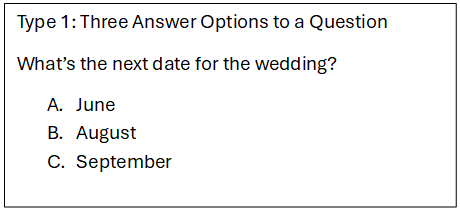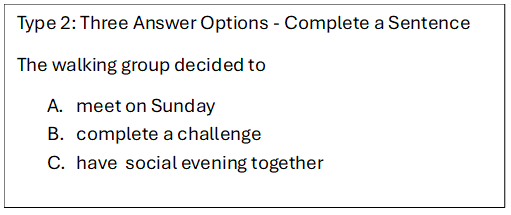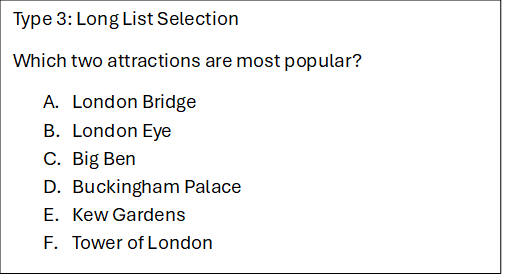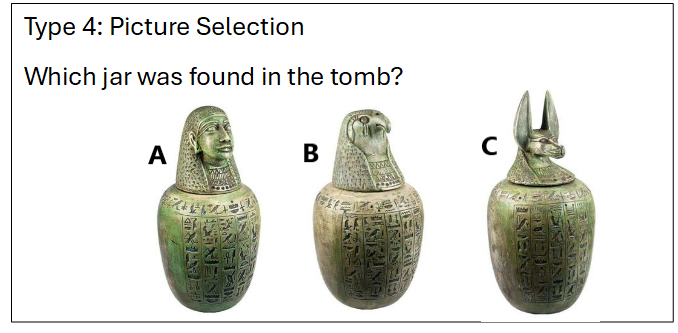This lesson focuses on IELTS listening multiple choice questions and offers tips, practice and useful vocabulary to help you achieve your best. Multiple choice questions are the most difficult of all the questions in IELTS listening and you need to develop the right techniques to deal with them in order to do well.
On this page, you will find:
- Multiple Choice Tips
- Multiple Choice Practice Lessons
- Practice 1: Long List Selection
- Practice 2: Picture Selection
- Practice 3: Common IELTS MC questions.
1) IELTS Listening Multiple Choice Tips
Preparing the Questions:
- check for a title
- you might be asked to respond to a question or complete a sentence
- find keywords in the question
- the keywords will help you understand which answers are right and which are wrong
- paraphrase the keywords
- if it is a list selection multiple choice, underline the number of answers you need to find – for example, choose three letters.
Preparing the Multiple Answers Options
- Read through the answer options
- highlight similar options so you don’t get confused
- note the differences between those options
- think of paraphrases for keywords
- All answer options will probably be mentioned in the recording – but only one will be the right answer.
- The questions come in order but the answer options will not come in order in the recording, for example you might hear language about option B before you hear option A.
- Don’t think that the first answer you hear is the correct one – keep listening.
- Watch out for answers that are given and then taken away again by the speaker. This means the speaking say “green” but later says “sorry, I meant blue”.
- Listen for the word “but” or “however” this can mean a negative is coming which means it might not be the right answer.
- If you think an answer is correct, put a tick but keep listening to make sure it is right.
- You can write on your question paper for the paper test so use ticks and crosses for right and wrong answers.
- Don’t forget, you can only listen once to the recording in your test. You can’t pause the recording.
- You must develop speed reading skills to be able to read all answers and spot keywords before the recording starts. This skill comes with practice.
Types of Multiple Choice Questions in IELTS Listening
There are four types of multiple choice questions that have appeared in the IELTS Listening Test over the years. Below you can see examples of them:




In your test, you will not see the words “Type 1” – this label is just for your reference on my website. As you can see above, there are Multiple Choice Questions that ask you to: 1) answer a question 2) complete a sentence 3) select from a long list 4) choose a picture (this is the least common and rarely appears but is still worth preparing for). For each type, your answer will be a letter. I have practice lessons so you can get used to these kinds of questions. See below.
2) Practice Lessons for Multiple Choice IELTS Listening
Below you will find three types of Multiple Choice Listening Practice Lessons. Take your time to do the exercises and also make sure you spend time after to review the transcripts so that you can analyse language, keywords and review your strategies. Enjoy!
Multiple Choice Listening Practice 1
Listening Topic: Health Care Conference
Questions 1-3: Who will be lecturing at the conference today?
Choose three options from the following list (A-G) as your answers
- A = Dr Christopher Lord
- B = Dr David Bishop
- C = Dr George Ripley
- D = Dr William Benson
- E = Dr Roger Dean
- F = Dr Daisy Mandalay
- G = Dr Ralph Morris
Recording:
.
ANSWERS & TRANSCRIPT
. It’s always best to check your answers reading the transcript and listening again to the recording. This is a great way to develop your listening awareness. After that, check the answer key.
TranscriptTranscript
Today’s topic under discussion is the health care system both past and present. We have a number of guests for today’s lectures, videos and debates, one of them the notable Dr David Bishop.
The morning will be kicked off by Dr Roger Dean who will be presenting his speech summarising the major changes and challenges of the health care system from the year 2000 to around 2012. Following him, will be Dr William Benson who will oversee the debate on today’s problems for hospitals. After lunch, Dr Daisy Mandalay will be showing a revealing video relating to the current trends in health problems faced by today’s society. Dr Christopher Lord will then address everyone on the problems faced by family doctors and the vital role they play in the health care system. Last, but not least, Dr David Bishop, as I mentioned earlier, will take the floor to tell you about his current research. Dr Ralph Morris will be responsible for collecting your feedback on the various parts of the conference at the end of the day. That will conclude our seminars for the day. Tomorrow’s conference details will be put up on the notice board later this afternoon but you will be all please to know that Dr George Ripley has agreed to lecture you all.
Answers
E A B (any order ). This question counts for answers to questions 1, 2 and 3. This means three points – one point for each correct answer. Because they are three questions from the same list, your answers (letters) can b written in any order.
- E
- ‘Dr Roger Dean who will be presenting his speech…’
- A
- ‘Dr Christopher Lord will address everyone…’
- B
- ‘Dr David Bishop, as I mentioned earlier, will take the floor to tell you about…’
Comments: The answer is not C (Dr George Ripley) because he is talking tomorrow not today. The answer is not D (Dr William Benson) because he is running a debate. He is not giving a lecture. The answer is not F (Dr Daisy Mandalay) because she is showing a video not talking. The answer is not G (Dr Ralph Morris) because he is collecting feedback and not speaking.
The key to success in this listening practice is to identify the word “lecture” as the key word in the question. Many names are mentioned but only three people are actually lecturing today.
Vocabulary
give a lecture / to lecture Synonyms:
- give a talk about / on
- to address people on
- give a seminar on
- hold a seminar on
- to take the floor (to talk)
- to instruct people on
- to give a speech about / on
- to present a speech / talk on about
.
**********************
Listening Multiple Choice for IELTS Practice 2
This is an example of a picture multiple choice. You must choose the correct picture as your answer based on the description in the recording. As always, your answer will be a letter.
Listening Topic: Mammoths
Question 1: Which type of mammoth is this lecture going to focus on?
Choose the correct letter A-C

Recording:
.
ANSWER & TRANSCRIPT
Click below to reveal vocabulary, transcript and answer:
Vocabularyphysiology = make-up / structure
prominent = major / outstanding
parts of an elephant and mammoth = tusks, trunk, large ears
huge / colossal = enormous / extremely large
‘Today, I’m going to be focusing on….. which is most known for its huge curving tusks and colossal size.’. This lesson is the perfect example of how you need to be patient and not get lost in long, technical words, because at the end of the day, the keywords were at the end and the rest was irrelevant information to the answer.
.
*******************
Multiple Choice Questions Listening Practice 3
Listening Topic: Dashford Study Center
Questions 1-4: Choose the correct letter A, B or C.
- Membership at the study center is 20 pounds
A. for everyone.
B. for everyone except the elderly and students.
C. for everyone each year.
2. Members are able to take out
A. an unlimited amount of books.
B. a maximum of 3 books.
C. 3 books for 3 days.
3. Booking is unnecessary for
A. the yoga, dance and gentle exercise classes.
B. general fitness classes.
C. the walking class.
4. Arts and crafts classes are taught by
A. volunteers.
B. teachers.
C. teachers and volunteers.
RECORDING:
.
TRANSCRIPT & ANSWERS
Below you can click to reveal the transcript and answers for this lesson.
TranscriptThe study center in Dashford was opened to give free educational and recreational services to the community of Dashford. Membership is free for over 65’s as well as for students, as long as they have a student ID. For everyone else it is an annual membership of 20 pounds.
Members are able to enjoy full access to our extensive library. The library comprises of a comprehensive collection of classic literature, resource books, children’s books, history books and popular literature. As members, you are able to borrow up to 3 books at a time for up to 4 days.
Our recreational services extend for both members and non-members. We offer social and leisure activities for all age groups. Our yoga, dance and gentle exercise classes are extremely popular and booking ahead is required to ensure your place on one of these courses. However, our walking group, who meet once a week, offer unlimited places but you do have to have a good level of general fitness. We also have IT classes at beginner, intermediate and advanced levels. But for those of you who are more creative, there are arts and crafts classes which are run by a qualified teacher with volunteer support. Before checking everything why don’t you take a look around and see what you might be interested in.
- B
- Common trap – Always be careful of words that you hear in the recording and see in the answer options – always look out for extra words such as “everyone else“.
- B
- A maximum of 3 = up to 3. This is a direct paraphrase.
- C
- unlimited places = no need to book
The trap in this question is that the word ‘booking’ was used with the information about yoga, dance and exercise – IELTS often give the same word with the wrong answer.
- unlimited places = no need to book
- B
- The classes are run by teachers = the classes are taught by teachers. The volunteers only support, they do not teach.
.
***********************











